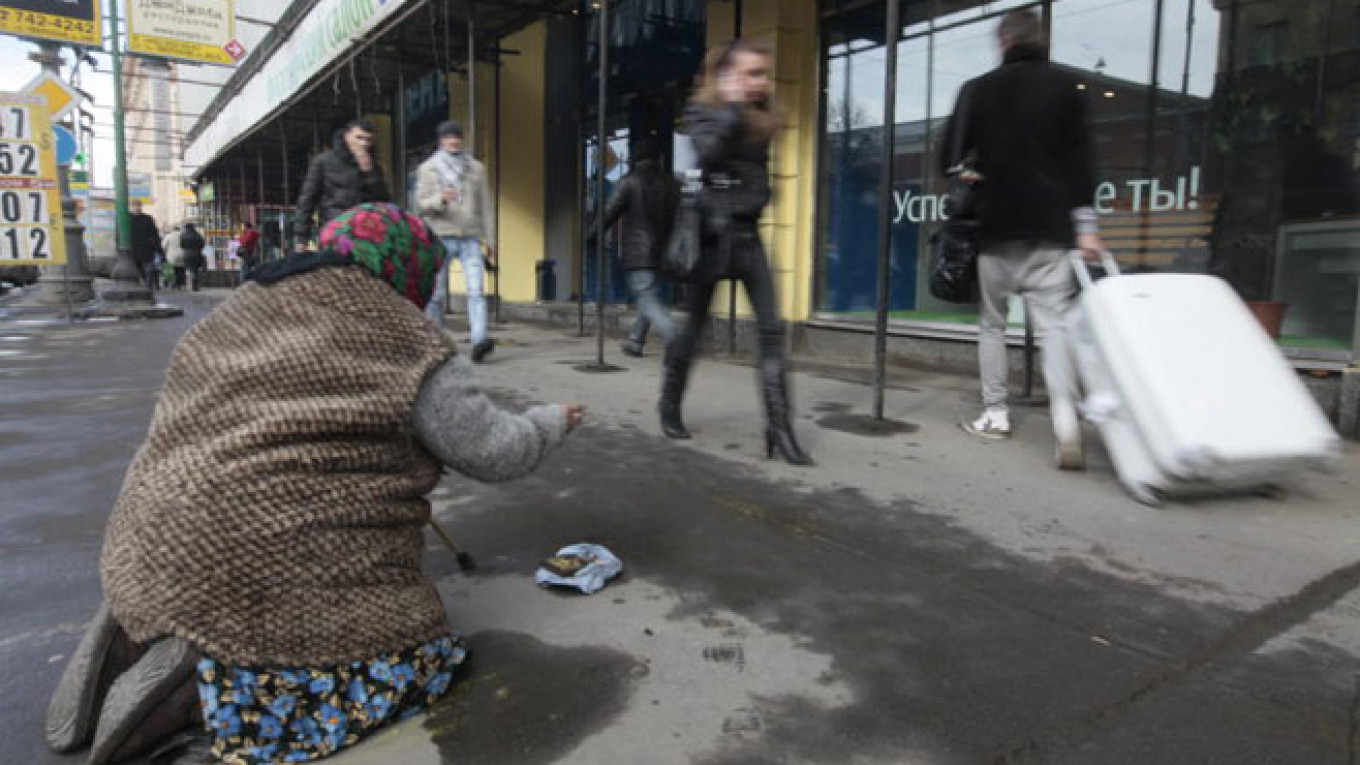More Russians have fallen into official penury as the country's economic troubles cause the largest increase in poverty of President Vladimir Putin's 15-year rule.
The government last week published an order raising its recognized bare minimum required to live in the first quarter of this year to 9,662 rubles ($180) per month, a 17 percent rise from the previous quarter and 25 percent more than in the first three months of 2014. The government adjusts the poverty line every quarter.
The increase is higher than inflation, which has surged over the past year as Russia's economy has faltered. But it far outstrips nominal growth in incomes, meaning more people will now find themselves below the poverty threshold.
Prices were 16.2 percent higher in the first quarter of this year than in the first quarter of 2014, while nominal incomes had risen just 11 percent over the same period, according to the Rosstat state statistics agency.
Russia's economy began contracting this year after being struck by Western sanctions imposed on Moscow over the Ukraine crisis and falls in the price of oil, Russia's main export.
The slump threatens to push nearly 2 million more people into official poverty this year, according to government estimates.
Setback for Putin
Such a rise would be a setback for President Putin, whose 15 years in power were accompanied by an oil boom that pulled tens of millions of people out of poverty.
In 2000, the year that Putin ascended to the presidency, 42.3 million Russians, or 29 percent of the population, were below the poverty line, according to Rosstat. With only the occasional wobble, the rate fell steadily through most of Putin's reign, hitting a low of 15.4 million people in 2012 before rising slightly the following year.
But last year, as Russian economic growth stalled, the number of Russians below the poverty line increased by 600,000 people to reach 16.1 million. The increase was the largest annual rise since 2000, and left 11.2 percent of the population in official poverty, according to Rosstat.
This year, with the economy expected to shrink by around 3 percent, will be worse.
The Economic Development Ministry said earlier this year that the share of people whose incomes are below the living minimum would increase to 12.4 percent by the end of 2015, according to news agency RIA Novosti.
Based on Rosstat's end-2014 population figure of 143.75 million, that rise would put 1.7 million more people into poverty, raising the number in penury to just over 17.8 million.
The World Bank in an April report was bleaker, predicting that 14.2 percent of Russians would be in poverty by the year's end, implying an increase of more than 5 million people to 20.4 million.
Children Hit Hardest
Those most at risk are families with children, experts told The Moscow Times.
Along with its overall poverty threshold, the government sets different minimum subsistence figures for different regions and social groups. In the first quarter the nationwide averages were 10,404 rubles ($193) for the working-age population, 9,489 rubles ($176) for children and 7,916 rubles ($146) for pensioners, according to the government.
This means pensioners were expected to get by on less than $5 per day on average, and working people on under $6.50 per day — which may be possible in rural regions where many supplement their incomes by growing their own vegetables, but would barely buy a cup of coffee in the capital, Moscow.
But while pensioners have the smallest number, they have the biggest guarantees.
"[State] pensions cannot be lower than the minimum subsistence level, but wages can," said Sergei Smirnov, director of social policy and socio-economic programs at Moscow's Higher School of Economics.
The official minimum salary that employers can legally pay workers is 5,965 rubles ($110) per month, just over half the official subsistence level for working-age Russians.
"The cost of raising a child is huge but monthly child benefits in some regions don't exceed 300 rubles ($5.50)," said Oksana Garnayeva, head of charity fund Russkaya Beryoza ("Russian Birch"), which supports low-income families and pensioners.
What's more, many regions don't have enough jobs, Garnayeva added.
Underestimating Poverty
The poverty line is a relative number, and the official statistics do not reflect the real level of poverty in Russia, analysts said.
"By global standards, the poor are considered those who earn 50 to 60 percent of the average wage in the country," said Alexei Zubets, the head of the sociology department at Moscow's Financial University.
In April, the average wage was 32,805 rubles ($607) per month, according to Rosstat. That means that those whose income is less than 15,000 rubles a month should be considered poor, not just those who fall below the 9,662 ruble official poverty line.
These people are not starving, but they can not afford anything but food and necessities, according to Zubets.
"And they account for 50 to 55 percent of the population," he said.
A Message from The Moscow Times:
Dear readers,
We are facing unprecedented challenges. Russia's Prosecutor General's Office has designated The Moscow Times as an "undesirable" organization, criminalizing our work and putting our staff at risk of prosecution. This follows our earlier unjust labeling as a "foreign agent."
These actions are direct attempts to silence independent journalism in Russia. The authorities claim our work "discredits the decisions of the Russian leadership." We see things differently: we strive to provide accurate, unbiased reporting on Russia.
We, the journalists of The Moscow Times, refuse to be silenced. But to continue our work, we need your help.
Your support, no matter how small, makes a world of difference. If you can, please support us monthly starting from just $2. It's quick to set up, and every contribution makes a significant impact.
By supporting The Moscow Times, you're defending open, independent journalism in the face of repression. Thank you for standing with us.
Remind me later.






